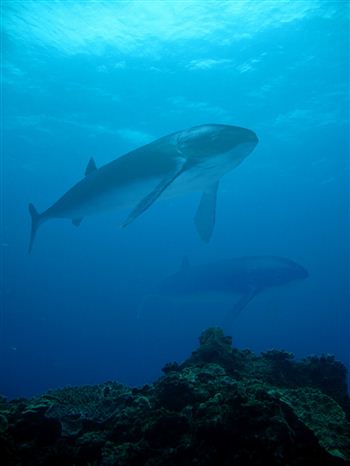PREVIOUSLY unknown species of plankton-eating fish dominated the seas for more than 100 million years before being wiped out along with the dinosaurs.
New research carried out by a leading Glasgow University academic has revealed for the first time a previously uncharted species of large bony fish swarmed the seas during the Jurassic and Cretaceous periods.
Experts have said that the new whale-like species is the crucial missing link in the understanding of fish, mammals and ocean eco-systems.
The creatures were wiped out in the cataclysmic disaster that made the dinosaurs extinct.
Dr Jeff Liston, who works at the Faculty of Biomedical and Life Sciences at Glasgow Univrsity, came across fossils of the creatures while excavating sites in Peterborough in England.
He had been working with experts from Oxford University, as well as researchers from universities in Chicago and Kansas when they found the fossils, which are said to said explain a scientific gap in history of millions of years.
160 million years ago
Dr Liston said: “The giant plankton-feeders we know to live in today’s oceans are among the largest living vertebrate animals alive.
“However, before them the only real animal known to occupy this role was a large fish called Leedsichthys that lived in the Middle Jurassic, around 160 million years ago.
“The fact that creatures of this kind were missing from the fossil record – for over 100 million years seemed peculiar.
“What we have demonstrated here is that a long dynasty of giant bony fish filled this space in time for more than 100 million years.
“It was only after these fish vanished from the ecosystem that mammals and cartilaginous fish such as manta rays, basking sharks, whale sharks began to adapt to that ecological role.”
12 metres long
Liston and his colleagues compared the new findings with the existing remains of the closest relation to the new species – nine metre plankton hunters called Leedsichthys – which are held in Glasgow.
However Liston found that the new creature could grow much larger, up to 12 metres, as large as a basking shark today.
Dr Liston said that the discovery allowed the team to go back to museums and re-examine the remains of creatures for traits and details had not been identified before.
‘Smoking gun’
He added: “The existence of these large suspension-feeding fish at this time is highly significant, as it would seem to be the first clear evidence of the presence of high levels of plankton in Earth’s oceans – a ‘smoking gun’ that they were there in large numbers.
“This has implications for our understanding of biological productivity in modern oceans, and how that productivity has changed over time.”
“These specimens indicated that there were giant filter-feeding fishes for much longer than we thought.
Misidentified
“We then started to go back to museum collections, and we began finding suspension-feeding fish fossils from all round the world, often unstudied or misidentified.”
Dr Matt Friedman at the University of Oxford, who was also part of the team that made the discovery, said: “The most important conclusion we show from these new discoveries is that rather than a blip on the evolutionary radar, this group of giant fishes had a long and successful history.
“They were cruising the oceans for at least 100 million years—substantially longer than any of the modern groups of giant plankton feeders have been around.”


